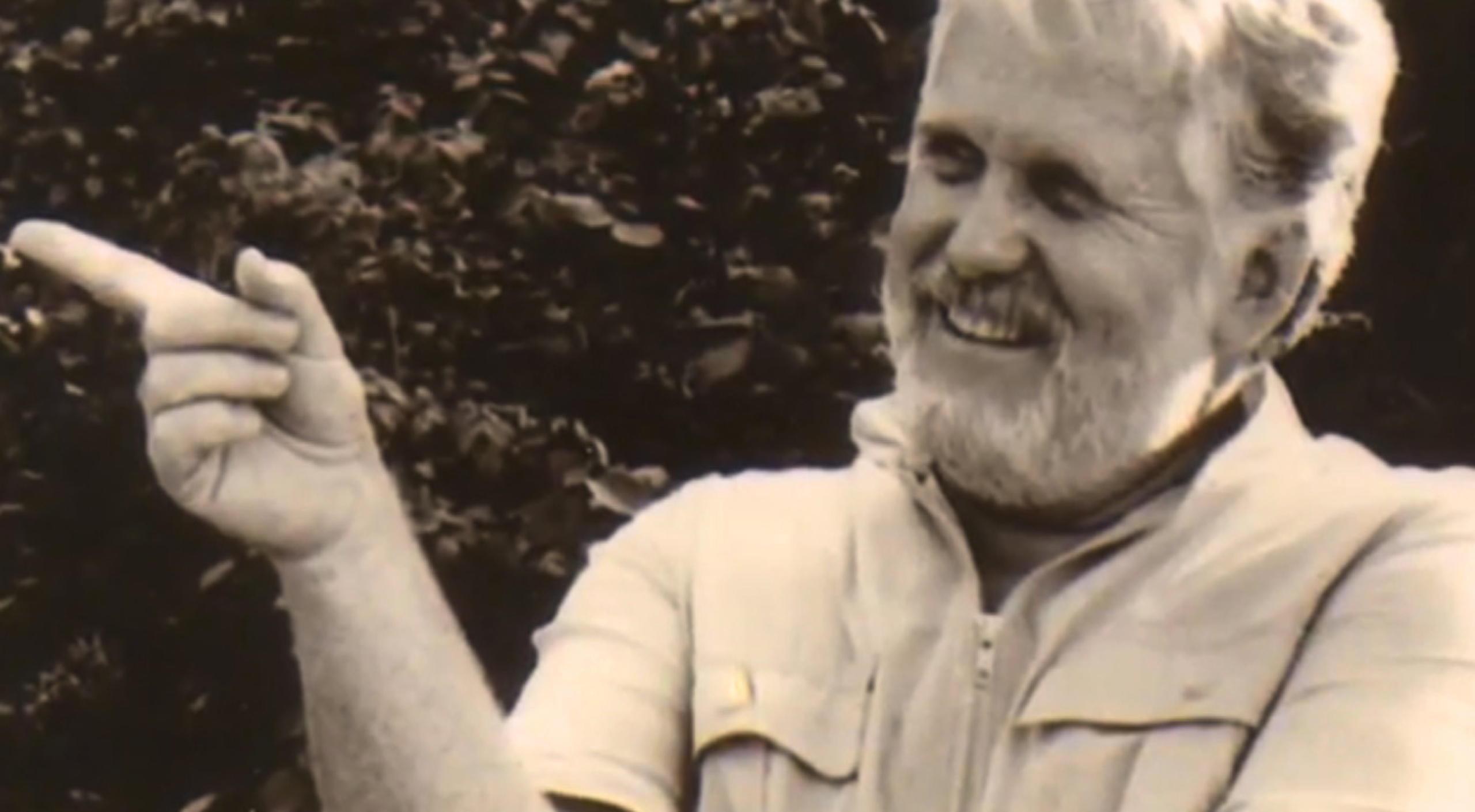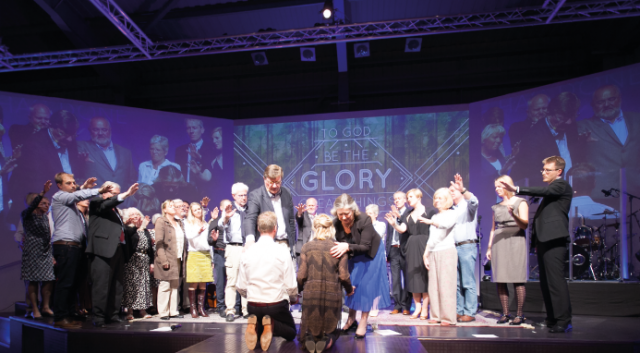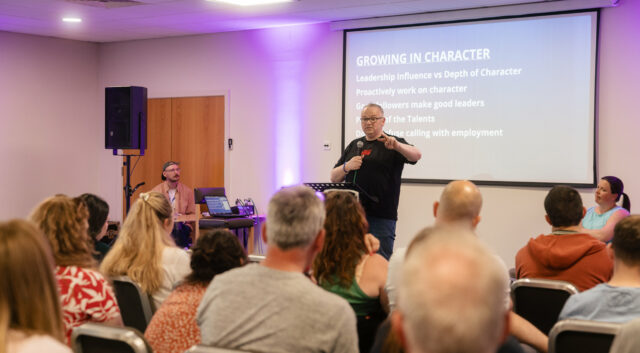A friends recollections of John Wimber, by Sandy Millar.
We first met John Wimber in the Spring of 1982 when he came to a meeting in the crypt here in Holy Trinity Brompton. We had never heard of him, but David Watson had said that we ought to invite him. We collected together all the homegroup leaders of the church-about eighty of us. John came with a little team and gave a talk about healing. When he had finished his talk, he said in his charismatic way, “OK. Now we II have a break and then we will come back and do some healing.”
My heart stopped because I didn’t know what “doing healing” meant. None of us knew really. We had that same sort of fruition when you think that the Spirit of God might appear: supernatural things might happen. And the flesh hates the supernatural.
So we had the longest coffee break we have ever had in this church. I was rushing around saying, “Have some coffee!”
“We’ve had some.”
“Have some more.”
“We’ve had some more.”
“Well, there’s lots there.”
I didn’t know what “doing healing” meant. None of us knew really.
Watching from the back row
I had sat in the front row for the talk on healing and I thought it would be selfish to sit in the front row again, so I went right to the back of the room and watched. John, as you may know, operated with words of knowledge and he had a number on this occasion. He said he believed there was somebody there with a “congenital back defect,” to which Jeremy Jennings (now Pastoral Director of HTB) responded. At the end of praying for him, he looked at Jeremy and said, “That will be 2p!”
We didn’t know whether or not to laugh because we didn’t know that John often had these flashes of self depreciating humour. That was his way of relieving tension because he hated religiosity.
Then he had a word of knowledge for a girl who was “trying to conceive” and he asked if she would like to come forward so that he could pray for her.
I was so embarrassed by the whole thing
I didn’t know where to look or what to do, I was so embarrassed by the whole thing. There were five or six married women in the room at that time and I knew them all. I also knew that not one of them was trying to conceive. They were all young couples getting going in life with mortgages, etc. I was also embarrassed because in this part of London we don’t talk about conception. We take part in the process, but we don’t talk about it. I presumed he didn’t know that because he came from California where I imagined they talked of nothing else!
I felt the whole thing was going wrong and I felt responsible in some way. Then, one of our leaders, Sarah Wright, got to her feet and said, “I think that must be me.”
The moment our fellowship grew up
I have often said that I think that was the moment at which our fellowship grew up. Because it suddenly became possible for a beautiful girl in a beautiful congregation in a beautiful part of London to confess that all was not well, that something was wrong in her life. John prayed for her with huge love-intensely and simply. He just put his hand on her head and commanded healing.
At theological college I had been taught that God doesn’t do that sort of thing today. Yet here was a man from America who seemed to think that God does do that sort of thing today.
Nine months later, Sarah Wright gave birth to a beautiful little boy. In our Anglican tradition, as you know, we baptise babies of believing families. I had the privilege of baptising this little baby and it was one of the most moving things that I have done. Since then Sarah and her husband have gone on to have four more children. They don’t know how to stop!
We caught it from John
John prayed for all of us-all in different ways. He opened our eyes to all sorts of things. He showed us that night what healing might mean.
I remember saying to my wife Annette on the way home, “If that is New Testament we have got to go for it,” because I saw already what a blessing it was to Sarah, to us and to the community.
Any tribute to John is a tribute to Jesus. What John taught us first and foremost was intimacy with Jesus. So many things flow from that, including the style of worship which we now use at many services at Holy Trinity.
There was none of that in this country before the Vineyard took it up. We caught it, as it were, from John.
The secret of the worship is a hunger for that intimacy with God which is the secret of the Christian life. It isn’t rules and regulations. It isn’t what you say in liturgy. It is seeking the favour of God-and the favour of God comes through Jesus.
John taught us the principal values of the Vineyard: “intimacy with God” and “intimacy with one another”. Everything else followed from that in his own inimitable style, which included a terrific sense of integrity, honesty and simplicity. He never tried to make things work when they weren’t working. He just asked the Spirit of God.
On one occasion when everything was hyped up – not through him -and everyone was “getting religious,” he broke off for coffee.
He wanted God to have the glory. He wasn’t going to use the emotionalism oF human beings. There was a total lack of pretentiousness that we loved. It felt like what Jesus would do if Jesus were here and Jesus is here.
Released
We are all the ministers of Jesus. “We get out on the street and we do this stuff,” he would say. We don’t just read about Jesus healing. We don’t just read about Jesus speaking to the poor and the lost and the underprivileged. We get to do it. John released everybody. He said the Christian church “is an army, not an audience.”
One of the high places that he tore down was exclusiveness-any attempt by any particular group of Christians to dominate or monopolise the Spirit of God. He told the story of when he was in prayer one day and asking God about some of these other denominations.
“What about the Baptists?” he asked God.
And the Lord said to him, “I love the Baptists.”
He said, “Really? All that simplicity…?”
“I love them.”
“What about Catholics?”
And the Lord said to him, “I love the Catholics.”
“Really? You mean all that smoke and smells?”
“I love it,” God said.
John went through the various denominations, and then he asked, “Is there any part of the church that you don’t like…?”
“Your part.”
It struck him in the heart and From that moment, if not before, he had that openness and the generosity that embraced every denomination: Church of England, Catholic, Salvation Army, Methodist, Free Church, House Church, New Church, Restoration Church.
For him, the Vineyard was but one vegetable in the stew, as it were, to give flavour. I would want to add that it was a very strong flavour and a wonderful flavour, but it was just one part of God’s church. Jesus loves the whole church. If we want to honour him, we must remember that.
It is an extraordinary thing to think of the effect that John Wimber has had. There is now hardly any part of the world that hasn’t been touched by the Vineyard.
From our point of view, John didn’t just touch the Church of England but the church in England. He came year after year and did conference after conference. I think the whole church owes him a tremendous amount. He gave us the confidence to change.
The importance of having intimate times with God
The first time I heard of the Vineyard style of worship was in Autumn 1982 when I went with about twenty-six people from HTB to the Vineyard church in Anaheim.
John had invited us to the conference and, of course, I couldn’t wait. It was in the Sheridan Hotel in Palm Springs, which was so liberating. When we weren’t in the sessions we were in the Jacuzzi outside. It was just enormous fun.
Bear in mind that our Sunday morning worship at that time was 1622 Sung Matins with a robed choir. We had the Venite, a Psalm, an anthem and hymns.
What I think noticed in the Wimber worship was the unconscious activity of the Spirit during the worship time, with songs addressed to God, such as: “Lord, we love you.” It was very different from the songs we had then.
We learned that worship leaders need to give us ten to fifteen minutes of real intimacy with God, without loss and additions and eccentric repetitions that bring us back from heaven. The band’s function is the same as the organ’s function: to lead us but not to interrupt us. We need time to tell we love him.
It is worth saying that, with the possible exception of the Romford Christian Fellowship, there was nowhere in Britain where we had worship of that kind, worship of twenty-five minutes, song after ;. If there were churches who sang such songs, they were nearly always interrupted by the vicar’s commentary.
He Provided the theology
John’s strength was that he provided the theology. I use it all over world now, if it is not too pretentious to say. If there is anything new in the church, he used to say, you will need a theology for it, a model for it and a practice for it. That is to say, you need to do it. He provided a theology for the song ‘Isn’t He beautiful, Beautiful, Isn’t He?” Otherwise we would have thought it was wet.
At Anaheim, while intimacy with was their number one value, their second value was intimacy one another. All this was a formative time for me.
The rest of the conference was pure sociology. It was about groups and groupings – but once again it was key for us here at Holy Trinity because we were going through all the things to which that conference was the answer.
People had been saying, “This church is too big, we want a small church where we can know everybody.”
I didn’t know what the answer was. None of us did because there was no literature written on church growth in English. There was only a little in American. Now we know why they were beginning to say, “We don’t like this church anymore.” It was because nobody noticed whether they came or not. Nobody asked how they were. This conference took us all the way through groups: kinship groups, homegroups, etc.
Because the Vineyard’s priority was intimacy with God and their engine for intimacy with God primarily was worship, what we began to understand (and felt instinctively) was that the key to releasing worship in the church was finding a smaller group in which it was possible to worship.
Proclamation follows demonstration
John Wimber often said, “Proclamation followed by demonstration” or, in some cases in Acts, “Demonstration followed by proclamation-but always the two going together.”
Before John’s arrival with us, there hadn’t been that emphasis. Charismatic things were all based around the spiritual gifts found in the Epistles.
What this did, of course, was to open up the Gospels once again. People weren’t preaching so much from the Gospels in those days because they didn’t expect these things to happen.
All we were dealing with was what Jesus had done.
Most people had no difficulty in believing that Jesus did those things. What they hadn’t realised was that Jesus did them and that he expected that we should do them.
Jesus wasn’t just showing them how wonderful he was: he was modelling it for us, and intended that the Kingdom should continue with that emphasis and agenda.
What God gave John was particular favour with us.
Other Americans had in the past presented different models of church life which, although perfectly good, were things which we simply couldn’t do, either because of our cultural setting (or our Anglican background), or because of the architecturally traditional setting of the church.
We didn’t like shouting. And John did not shout. He spoke peacefully.
We weren’t keen on models which appeared eccentric and odd.
But John provided a model that showed us the day of the “expert” was over. The model was simply that you put your hand on people’s heads and prayed. And we thought, “Well, we can do that.”
We didn’t know that there was a certain amount of prayer and fasting beforehand, but the model we took to straight away because it was not eccentric.
It has become second nature to us now but we have to keep an eye on the whole issue of simplicity.
Even now, there doesn’t seem to be a conference in this country where people don’t come back with some new oddity, some eccentricity, that makes people say, “That is weird. I don’t want that.”
Church growth analyst
John Wimber’s great strength was that he was a church growth analyst. That was his job. By the early 1980’s he had visited about 600 to 700 churches throughout the United States. His job was to go round, analyse the churches and help them understand why some things worked and others didn’t.
It is so hard in church life to get reality. You are deemed to be unspiritual if you ask practical questions. It was from him that we got the expression, “You can tell what you are committed to by looking at those things to which you give your time, energy and money.”
He used to go to all these churches and ask, “What do you really value?”
“We really value foreign missions.”
So he said, “How much money do you give to foreign mission?”
“Oh well. We haven’t given much this year because we have been doing x, y and z.”
And he would reply, “Well that tells me how much foreign missions is precious to you.”
It was the reality of it that was so attractive.
I went to those conferences in California in 1982, 1983, 1984 and 1985: four key years. They covered aspects of church growth, spiritual warfare; prayer and healing. In all these conferences there was ministry and worship.
Most can’t handle intimacy
When I first came back from these conferences and started talking about intimacy with God, I came in for some criticism. I was taken to one side by a woman who said, “Please don’t use the word ‘intimacy’ because we don’t use it in that context.”
So I started talking about the “closest possible relationship with God.” Then I gave up because it was such a mouthful and what I meant was intimacy.
Because that is what God means by intimacy. It is there in the Bible. We rarely preach on the Song of Solomon because we don’t know how to handle it. Most of us as married men in our culture do not know how to handle intimacy within marriage. We have to stumble our way forward because it is not part of our culture if you come from a background of stiff upper lip and two World Wars.
That had to be re-learnt and of course there is a danger, as one person who expressed a reservation about the way it was going said, “It is all too chummy. You don’t seem to realise that this is the God who created the universe.”
If we are getting too “chummy” then we must stop because we must be respectful and reverent. But we can remember that it is God who has invited us into this relationship with him as sons and daughters.
But the model John gave us wasn’t soppy; it was responsible and responsive and obedient. It is the same with children; if intimacy with children means that a child can do what he likes, then we have misunderstood the word intimacy.
Having seen the model in California, it gave me the confidence to know that it could work.
After I was appointed Vicar in 1985, we changed the 11 a.m. service from 1662 Matins to ASB (Alternative Service Book) Morning Prayer.
We tried that for about three months and it was a disaster.
People who liked 1662 Matins knew that it was not 1662 and those who didn’t like 1662 thought it was!
So we moved to ASB Communion, which was too long. It is a terrible thing to say in a Eucharistic community but there simply wasn’t time for prayer ministry at the end of the Sunday morning service. So now we have Communion once a month at 11 a.m., apart from our regular 9 a.m. Communion Service.
The evening service had already moved into having this extended time of worship. But then those attending the evening service got married, had babies, and wanted to come in the mornings-but to enjoy the style of worship which they could find in the evenings.
And these experiences of ours were being multiplied at churches all over the country which I think was the Spirit of God.
Manifestations
John always played down manifestations of the Spirit by making people laugh when they were going on. It was a way of releasing tension in order to get genuine spirituality rather than religiosity which was always his enemy.
He often spoke of “good news and bad news.”
On many occasions he said, “
.”The good news is that Jesus is interceding for you. The bad news is you are going to need it
At other times he said, “The good news is that we are all on our way to heaven. The bad news is that we have got to get there poor.”
He was very warm-hearted and generous, encouraging man. There was no side to him. And we miss him.
Adapted from
Ed. D. Pytches. John Wimber. His Influence and Legacy, Eagle (Guildford 1998)









